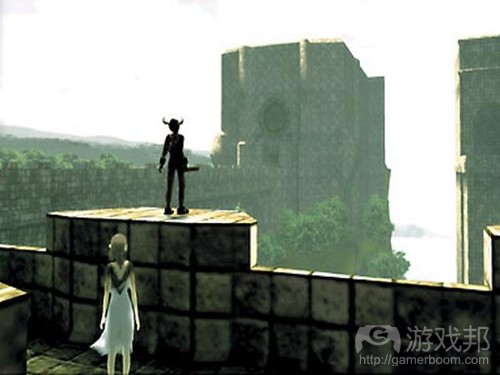电子游戏的叙事潜能或超越其他媒体
作者:Ethan Clevenger
最近,我看到一本叫作《Ico: Castle in the Mist》的小说,是根据广受好评的PlayStation 2游戏《Ico》改编的。这让我感觉到非常奇怪。我拿起书再翻了几页,确实,像是一本好书,但似乎遗漏了什么东西。正如我所想的,我意识到所有可以有效地改编成书的电子游戏都没有充分发挥其叙事潜能。
《超级马里奥兄弟》除了让玩家打打杀杀几小时,不见得有太多叙事深度。《古惑狼》(Crash Bandicoot)的剧情不过就是你要阻止Cortex博士谋取世界霸权。
这类游戏仍然存在。《格斗之王》(Mortal Kombat)没有太大突破,但许多其他类型的游戏剧情丰富得就像当下的热门电影。过去我可以用这些游戏跟不太“了解”游戏的人争论。你喜欢书?你喜欢电影?那你也应该会喜欢游戏,至少某些游戏。但是,在书店,我才发现自己的论据比实际情况脆弱得多。电子游戏的叙事能力本该远比这些书或电影有效。
书是以第一人称或第三人称写的。在第三人称的书中,读者看到是关于某人或某物的事。例如,Ico推倒大厦。这看起来好像不是很应景。又或者,Shepard中校拯救geth。受《质量效应》的启发,我伪造了这么个言论。我拯救geth。或者,我剿灭了这个种族!不过在这个情境之下,这个叙述听起来不怎么实在。
那么第一人称视角怎么样呢?比如,我拉动控制杆。有人告诉你这件事。不过现在,我会更宁愿亲自爆炸《辐射3》的百万镇,而不是让别人告诉我。 我们知道主要角色一直活到最后(一不小心剧透了)。另外,所有玩过这款游戏的人会告诉你,Ico说话并不多,除了“来吧!我们走!”
虽然电影给叙事文学提供了感官上的材料,但困境仍然存在。观众仍然看着一幕幕情节,任随它们在自己面前闪过。
并非所有游戏都建立在这样的概念之上。虽然我挺喜欢《合金装备4:爱国者之枪》的玩法,但真正吸引我的是过场动画和剧情。我可以坐下来心满意足地把这些内容连续看完。但同时,还有其他游戏更胜一筹。
我不是在说处理更成熟更复杂的主题如《à la Catherine》或《Papo & Yo》。我是说一种全新的体验。我说的是全身心地融入游戏中。
游戏一开始就深谙此道。先描述故事的背景,大多是这么开始的,“你将扮演……”或“你将成为……”这些开场表明了故事将带我们走进一片长期萧条的领域。游戏的这种属性改变了我们与剧情的关系,我们不是听到故事,而是亲身经历了故事。在这个过程中,我们的同情和共感融为一体。我们感到的不是“真令人悲伤”,而是“我经历过这些,我知道这种悲伤的感觉。”
我们再深入一点地谈《Ico》。在游戏中,一个长着双角的少年要拯救一个奇怪的少女。在许多方面,可以认为主人公的内心就是一座大城堡。最大的游戏玩法元素是什么?按住R1键。握住少女的手。不要放开。就这么简单,没有过场动画也没有对话,就是这么强大的机制。任何要放开手的情况,都会让你感到害怕担忧。虽然,魔女的进攻会让你心跳加速,但这不是最令你害怕的时候。最深的害怕出现在游戏结束的那一幕,但那种害怕不是因为逃不出城堡,而是因为她。当游戏的末尾,失去少女会让玩家热泪盈眶。简单的牵手动作创造了亲临其境之感和责任感,使《Ico》从其他的游戏中脱颖而出。
现在的游戏甚至更进一步,实际上建立在“选择你自己的道路”的书之上。如《goosebumps》等儿童书就曾经使用了这个把戏。
当玩家化身为Shepard中校,一个一直梦想着成为宇航员的玩家角色,这些“选择你自己的道路”的决定就主宰了整个种族的命运。在Quantic Dream公司出品的《暴雨》中,这个“伎俩”掌控着一个记者、侦探、FBI探员和一位父亲和他年轻的儿子的生死。极少电影能达到这种效果。我能想出的唯一的例子是录像带伴奏版的《Clue》,不过它被当成游戏出售。
如果你并不“不解”游戏,我就只能说,有时候游戏讲故事的能力真的比其他任何媒体都强。
《Ico》可能会是一本好书,但当然没有达到与游戏一样出色的程度。(本文为游戏邦/gamerboom.com编译,拒绝任何不保留版权的转载,如需转载请联系:游戏邦)
Video games have more storytelling potential than any other medium
by Ethan Clevenger
Recently, I came across Ico: Castle in the Mist, a novelization based on the critically acclaimed PlayStation 2 title Ico. This struck me as odd. I picked up the book and gave it a once over, and after a couple of pages, sure, it seemed like a good read, but something was missing. And as I thought about it, I realized that any video game that can effectively be translated into a book is not pushing the storytelling to its full potential.
Super Mario Bros. doesn’t have much narrative depth beyond being something you could kill a couple of hours with. Crash Bandicoot’s story didn’t involve much more than Dr. Cortex seeking world domination and you stopping him.
And these sorts of titles still exist. Mortal Kombat isn’t pushing a lot of boundaries, but plenty of other gems are out there with just as much to say as any of today’s blockbuster films. These games used to fuel my arguments with people who didn’t “get” games. You like books? You like movies? You’ll like games, at least some of them. But there, in the book store, I saw that the argument is a great deal weaker than it should be. Video games have the potential to be much more effective than those books or films could ever be.
Books are written in first- or third-person. In the third-person style, you’re reading about someone or something. Ico pushed the block. Well, I guess. That doesn’t seem to encapsulate the situation, though. Commander Shepard saved the geth. That Mass Effect-inspired statement is just plain false. I saved the geth. Or, for some, I killed off the entirety of that species! The statement isn’t particularly effective in this context.
What about the first-person perspective? I pulled the lever. Someone is telling you about it. Not only would I much rather blow up Fallout 3′s Megaton on my own than have someone tell me about it, but now, we know that the main character lives until the end. Spoiler by way of voice. Besides, as anyone who played the game will tell you, Ico isn’t much of a talker beyond, “Come on! Let’s go!”
While movies have lent visual stimuli to the otherwise fine stories literature has long produced, the dilemma remains. The participant is still watching the action, letting it play out in front of him or her.
Not all games are built on this notion. While I enjoy the gameplay of Metal Gear Solid 4: Guns of the Patriots well enough, the cutscenes and narrative really got me. I could sit and watch all of those in succession and be content. But at the same time, other games have pushed further.
I’m not just talking about tackling more mature and complex themes à la Catherine or the upcoming Papo & Yo. I’m talking about a new experience altogether. I’m talking about being invested in a game at a personal level.
Games are very good at this from the get-go. Describing the premise of an interactive title, in many cases, begins with “You play as…” or “You take on the role of….” These statements highlight the mountains they allow us to move in the long-stagnant field of storytelling. By their very nature, games change the way we relate to the tales we are no longer hearing but experiencing. It parallels the differences between sympathy and empathy. “That seems sad” versus “I’ve experienced that, and I know how that sadness feels.”
Let’s bump it up another level with Ico. A boy with horns sets out to rescue a strange girl. The antagonist is, in many ways, a giant castle. The biggest gameplay element? Holding the R1 button. Keep her hand in yours. Don’t let go. It’s so simple but, with a notable lack of cutscenes or speech, an incredibly powerful mechanic. Any situation you approach where you have to let go is met with dread. A demonic attack causes your heart to accelerate. Sure, the underlying fear is a game over screen, but that fear is so closely related to her not escaping the castle. Falling away from the girl as her path retracts later in the game can lead many to tears despite nonexistent narrative character development. The simple hand-holding objective created a personal investment and responsibility that set Ico aside from many of its peers.
Today’s games are moving even beyond that, effectively building on the choose-your-path books, a gimmick once reserved for children’s franchises like Goosebumps, hardly a tool to be taken seriously.
These choose-your-path decisions now decide the fate of entire races when placed behind the guise of Commander Shepard, an avatar for your long-repressed dreams of being an astronaut. That “gimmick” now means life or death for a reporter, a private eye, an FBI agent, and a father and his young son in Quantic Dream’s Heavy Rain. Very few movies have even approached this. The only example I can think of is a video-tape-accompanied version of Clue, which was marketed as a game anyway.
If you don’t “get” games, the only thing I can say is sometimes a title could tell a story in a better way than any other medium.
Ico might be good as a book, but it’s certainly not on the same level as the game.(source:venturebeat)









































 闽公网安备35020302001549号
闽公网安备35020302001549号